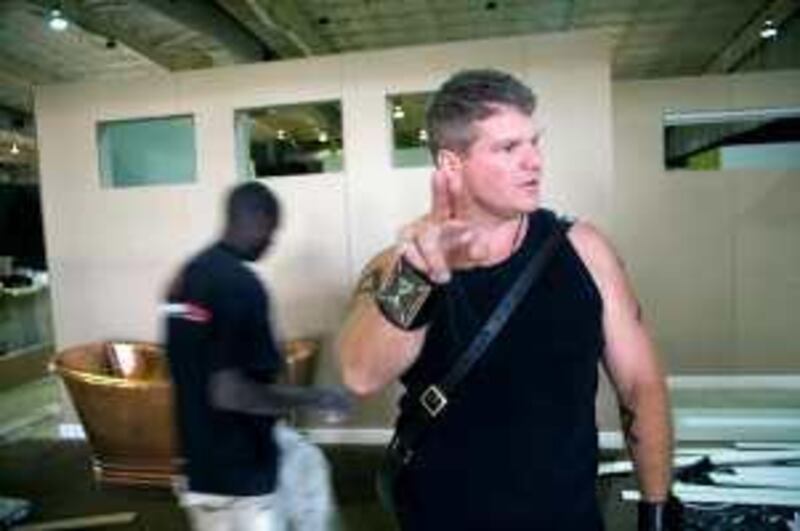MIDRAND, SOUTH AFRICA // The voyages of Thor Heyerdahl, the Norwegian explorer and anthropologist, captured the world's imagination, sailing the balsa-wood raft Kon-Tiki across the Pacific Ocean to demonstrate that Polynesia could have been colonised by emigrants from South America, and taking the reed boat Ra II across the Atlantic from Morocco to Barbados. His grandson, however, has been promoting his own message of environmentalism and ecology in an infinitely more prosaic setting this week, at a home decoration exhibition in South Africa.
Bjorn Heyerdahl, 41, is a burly Scandinavian, albeit born in South Africa, with Norse runes tattooed on his body and who named his consulting company Midgard, the Viking word for "middle earth", the world in which humans live, according to Norse mythology. The Gallagher Estate, a series of cavernous exhibition and meeting halls in Midrand, a new town between Johannesburg and Pretoria, where the upscale Decorex show was being held, is about as far from his ancestors' environment as it is possible to be.
But Midgard, which advises on eco-friendly building and urban design, was allocated an entire exhibition hall to manage, filling it with green housing products and examples of environmentally friendly architecture, from heat-storing floor tiles and solar-powered electricity generating panels to a "food forest" garden, microbiologically-balanced ponds, and a house with large windows on its sunny aspect and small ones on the shady side.
"We haven't gone hard-core green where only the hippies can visit," he said. "There's shades of green if you look between what we would ideally like to have and what there is. These people own big houses, I want to show them you can own a big house and still be intelligent, even if I would rather they didn't have such a big house." On a mission to "remind people of the sophistication of life on earth and seeing how beautiful and endangered it is", he said it was essential for environmentalists to talk to consumers on their own terms, adding that it was impossible to persuade people to go back to "running around in a loincloth".
"Somebody has to meet them here," he said. "We need to be cognisant of what the rest of society is doing and engage with them, engage the average housewife, the average corporate. I would like them to consume less but at the beginning I would like them to consume more considerately, conscious consumption, not conspicuous consumption." Nonetheless, he accepted the irony of his role at the event. A sailor and climber himself, he has spent much of his life in remote parts of southern Africa, and mounting expeditions around the world. "This is wild for me, I'm at Decorex in South Africa," he said.
"It's the first time I have been to anything like this in my life, I'm perfectly content being left alone in a natural environment. But every time I find a quiet spot someone comes and cuts down all the stuff around me." Many of the problems faced by urban man, he argued, are the result of "the ill-considered imposition of human will on the landscape", citing Johannesburg's own issues with its water supply, which has to be pumped large distances and stored in reservoirs, as a prime example - the city did not grow up over centuries in a location naturally suited to mass human habitation, but is the result of a gold rush that began about 120 years ago.
"We have been paying quite a price for that, but that's a global problem," he said, adding that it is a similar phenomenon to those that contributed to the downfalls of several ancient civilisations, from the Persians and Babylonians to the Romans. "We have got to start learning these lessons. The lack of humility we have had on that front as a species is what has caused us to sit where we are now," he said.
At the decor show, he believes that humanity needs to take a "biospheric approach", aligning its activities with the Earth, "which has 3.85 billion years of research and development of human life". "Most people will die without understanding their home. We have to have a polymathic approach. Leonardo da Vinci would have been sidelined in academia today because he would have been called a generalist, not a specialist," he said.
sberger@thenational.ae





